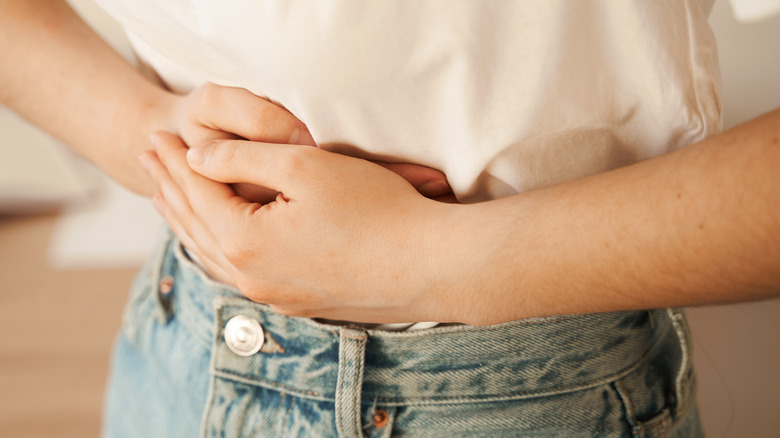What Happens To Your Stomach When You Hold In Your Poop
We all want our privacy when using the bathroom, particularly when going number two. Sometimes, however, our environment is anything but private. Maybe you're shopping at the mall and your only option is to use a public restroom. Or perhaps you're at a music festival attempting to relieve yourself as fast as possible, knowing there's a long line of people waiting for their turn just outside the porta-potty door. Rather than face public embarrassment, you decide to grin and bear it and attempt to hold in your poop until the urge passes.
Although you may be sparing yourself a potentially awkward encounter, you're likely wreaking havoc on your stomach by holding in a bowel movement. Let's break it down, so to speak. When we tense up to hold in our poop, we activate the puborectalis muscle, explain experts at Carolina Digestive Health Associates. This added pressure essentially forces stool to move backwards from where it came, retreating from the rectum to the large intestine. Water is then leached from our waste and reabsorbed, leaving us with dry feces that are more difficult to pass. As a result, holding in your poop can be a recipe for constipation and abdominal discomfort.
Constipation and stomach distention may occur
Constipation related to holding in one's poop is a problem often observed in young children, according to 2014 research published in Przegla̜d Gastroenterologiczny. The researchers outlined how painful bowel movements can lead to anxiety around defecation in children as young as 1 to 3 years old, particularly as they undergo the new and uncharted world of potty training. Subsequently, children may try to resist defecation, leading to constipation. Among other symptoms, stomach distention may occur. Arching one's back, wiggling, fidgeting, squatting, and lifting up onto one's toes are all signs that a child may be holding in their poop.
Constipation isn't the only way in which holding in our stool can affect the stomach, however. "Holding in bowel movements can be thought of as backed-up plumbing in your body," co-founder of LabFinder.com Dr. Robert Segal told Well + Good. "The major problems associated with this are caused by fecal bacteria overload. Much of this gas-forming bacteria can result in abdominal pain due to gas overload and bloating."
You may increase your risk of gastrointestinal problems
If holding in your poop becomes a habit, you may be increasing your chances for more severe gastrointestinal issues down the line. This includes anal fissures, hemorrhoids, fecal incontinence, appendicitis, colon cancer, fecal impaction, or a potentially fatal gastrointestinal perforation should stool back up all the way into the stomach (via Carolina Digestive Health Associates).
It's understandable to feel some level of discomfort around going number two in a not-so-private setting. For some people, however, this apprehension is so great that it manifests in the form of shy bowel syndrome, or parcopresis, in which a person is physically unable to use a public restroom due to fear and anxiety (via Banner Health). Because holding in your poop can pose potential health risks to your stomach and more, talk to your physician or a mental health specialist if you feel parcopresis is impacting your day-to-day functioning.
At the end of the day, know that it's perfectly healthy and normal to poop anywhere from three times daily to three times weekly, according to Medical News Today. Ultimately, it's a natural bodily function that indicates all is running as it should.



